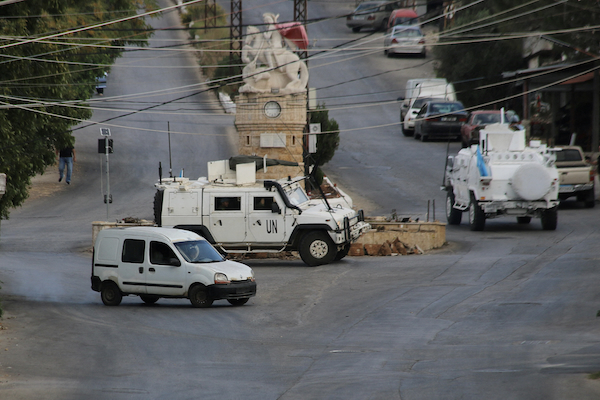 The UNIFIL United Nations peacekeepers' vehicles drive on a road amid ongoing hostilities between Hezbollah and Israeli forces, in the town of Qlayaa, southern Lebanon, 18 October 2024;
Credit: REUTERS/Karamallah Daher
The UNIFIL United Nations peacekeepers' vehicles drive on a road amid ongoing hostilities between Hezbollah and Israeli forces, in the town of Qlayaa, southern Lebanon, 18 October 2024;
Credit: REUTERS/Karamallah Daher
UNITED NATIONS (Reuters) - The United Nations (UN) will cut a quarter of peacekeepers in nine operations around the world in the coming months due to a lack of money, senior UN officials said on Wednesday 8 October 2025, and as future funding from the United States remains uncertain.
"Overall, we will have to repatriate... around 25% of our total peacekeeping troops and police, as well as their equipment, and a large number of civilian staff in missions will also be affected," said a senior UN official, speaking on condition of anonymity.
That would amount to between 13,000 and 14,000 troops and police, the official said.
Washington is the UN's largest peacekeeping contributor, accounting for more than 26% of funding, followed by China which pays nearly 24%. These payments are not voluntary.
The US was already $1.5 billion (€1.38 billion) in arrears before the new financial year began on 1 July 2025, said a second UN official. Washington now also owes an additional $1.3 billion (€1.12 billion), taking its total outstanding bill to more than $2.8 billion (€2.4 billion).
The US has told the UN it will make a payment shortly of $680 million (€5.83 billion), the first UN official said. The US mission to the UN did not immediately respond to a request for comment.
US President Donald Trump in August unilaterally cancelled some $800 million (€6.86 billion) in peacekeeping funding appropriated for 2024 and 2025, according to a Trump administration message to Congress.
The White House budget office has also proposed eliminating funding for UN peacekeeping missions in 2026, citing failures of operations in Mali, Lebanon and Democratic Republic of Congo.
The peacekeeping operations affected are in South Sudan, Democratic Republic of Congo, Lebanon, Kosovo, Cyprus, Central African Republic, Western Sahara, the Golan Heights demilitarized zone between Israel and Syria and Abyei - an administrative area jointly run by South Sudan and Sudan.
UN Secretary-General Antonio Guterres is also more broadly seeking ways to improve efficiency and cut costs as the world body turns 80 this year amid a cash crisis.








